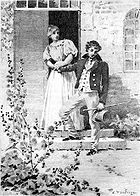
Honorine (novel)
Encyclopedia

France
The French Republic , The French Republic , The French Republic , (commonly known as France , is a unitary semi-presidential republic in Western Europe with several overseas territories and islands located on other continents and in the Indian, Pacific, and Atlantic oceans. Metropolitan France...
novelist and playwright
Playwright
A playwright, also called a dramatist, is a person who writes plays.The term is not a variant spelling of "playwrite", but something quite distinct: the word wright is an archaic English term for a craftsman or builder...
Honoré de Balzac
Honoré de Balzac
Honoré de Balzac was a French novelist and playwright. His magnum opus was a sequence of short stories and novels collectively entitled La Comédie humaine, which presents a panorama of French life in the years after the 1815 fall of Napoleon....
(1799-1850) and included in his series of novels
Novel sequence
A novel sequence is a set or series of novels which share common themes, characters, or settings, but where each novel has its own title and free-standing storyline, and can thus be read independently or out of sequence.-Definitions:...
(or Roman-fleuve) known as La Comédie humaine
La Comédie humaine
La Comédie humaine is the title of Honoré de Balzac's multi-volume collection of interlinked novels and stories depicting French society in the period of the Restoration and the July Monarchy .-Overview:...
(The Human Comedy) which parodies and depicts French
France
The French Republic , The French Republic , The French Republic , (commonly known as France , is a unitary semi-presidential republic in Western Europe with several overseas territories and islands located on other continents and in the Indian, Pacific, and Atlantic oceans. Metropolitan France...
society
Society
A society, or a human society, is a group of people related to each other through persistent relations, or a large social grouping sharing the same geographical or virtual territory, subject to the same political authority and dominant cultural expectations...
in the period of the Restoration and the July Monarchy
July Monarchy
The July Monarchy , officially the Kingdom of France , was a period of liberal constitutional monarchy in France under King Louis-Philippe starting with the July Revolution of 1830 and ending with the Revolution of 1848...
(1815-1848). Balzac has a subtle way of approaching his plot indirectly and embedding a story within a story. The story is perhaps a common one of a wife trapped in a marriage, but is approached in an interesting manner.
Plot summary
Maurice is a Consul at Genes, a Mediterranean town where he has married Onorina the daughter of the only wealthy man into the town, although it seems he was originally extremely reluctant to get married. They are having a dinner party with guests from Paris, and Maurice recounts some of his history.When Maurice was young, he became secretary to Count Octave. The count was very good to him but seemed very sad and mysterious as if hiding some past misfortune. Eventually Maurice discovers that he had been married, but his wife had left him. She, Honorine, had been brought up with him from a very early age, having been adopted by his parents, and they were devoted to each other. They had become married almost as a matter of course. However after a few months she just disappeared. Octave then discovered she had gone off with an adventurer who had abandoned her, pregnant. She had the child but lived full of remorse, and resisted all attempts of Octave to get in touch with her. Octave is still devoted to her and secretly helps her in her business of flower arranging. However she still refuses to have anything to do with him. The Count therefore gets Maurice to act as a go between, arranging for him to occupy the house next to her, and pose as a misogynistic flower breeder. Eventually Maurice makes contact and indirectly puts the Count’s case. Honorine is still too overcome with remorse and shame. Eventually however she agrees to see the count, and then goes back to live with him.
Maurice has to leave the Count’s company because of the part he played and that is why he became consul. Two years after, he heard of the death of Honorine, and soon after was visited by the Count who had grown old before his time, and who died shortly after departing. The story is full of discussion about the meaning of relationships and Maurice acts throughout as interpreter for the two parties. There is also the implication that he had in fact fallen in love with Honorine himself, which is why he avoided marriage initially.
External links
- The Human Comedy by Honoré de Balzac hosted by Carnegie Mellon UniversityCarnegie Mellon UniversityCarnegie Mellon University is a private research university in Pittsburgh, Pennsylvania, United States....
.

